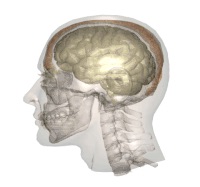
You don’t have to receive a blow to the head to suffer from brain injury. In fact, you can even injure your brain while wearing a helmet. This is because brain tissue is very delicate — the consistency of soft butter or egg white — and floats inside a skull lined with hard ridges. Impacts to the body, falls, and neck injuries are all it takes to injure the brain, especially if they happen repeatedly.
Here are some ways you can sustain a brain injury without ever hitting your head:
Hard falls: When you fall your brain slams into one side of your skull and then the other. People who engage in activities that involve falling and crashing regularly (football, extreme sports, roller derby, etc.) should be aware of signs of brain injury, even if they wear a helmet.
Body slams (such as in contact sports): Likewise, full impact hits to the body knock the brain around inside the skull.
Landing on your tailbone: Although landing on your tailbone results in a sore bum, your brain is also victim to the force sent up the spine.
Whiplash: Whiplash is a double whammy to the brain, which is why car accidents can be so devastating even if you didn’t directly injure your head. Not only does the whiplash send the brain crashing back and forth inside the skull, but the shearing and twisting forces in the neck can also damage the brain stem. The brain stem may look simply like the connection between the brain and the neck, its an extremely important center of brain function. Damage to the brain stem can cause anxiety, insomnia, extreme moodiness, gut problems, autonomic problems, and extreme sensitivity to light, sound, and crowds.
Falls and crashes also damage the fragile inner ear, or vestibular system, which plays a vital role in brain function and integrity.
The reason football players and extreme athletes are making headlines is because repeated impacts to the body and head continually inflame and damage the brain, overwhelming its ability to recover until it eventually succumbs to dementia and Alzheimer’s.
Brain injury increases risk for more brain injury
One of the most prominent signs of brain injury is worsened balance and coordination. Unfortunately, these symptoms predispose a person to further injure their brain due to increased clumsiness. Just one concussion increases the risk of a second by 150 percent. After two concussions, your risk for a third goes up by 300 percent. This is why it’s so important to seek functional neurology and functional medicine interventions right away when you suspect you have injured your brain.
Poor brain health increases brain injury risk
It’s not just how many times your brain slams around inside your skull that matters, but also the general health of your brain prior to injury. This is why some people recover more quickly from injury than others. If you eat fast foods regularly, are deficient in vital brain nutrients — such as essential fatty acids and vitamin D have undiagnosed food sensitivities (especially to gluten), or suffer from hormonal imbalances or deficiencies, your brain is going to fare more poorly after an injury.
Because inflammation in the brain does not have an “off switch” the way it does in the body, brain inflammation is like a slow moving fire that can damage tissue for months and even years, causing symptoms long after the insults. The good news is that for all its fragility, the brain is an amazing organ when it comes to recovery and repair. It will eagerly respond to functional neurology and functional medicine protocols to improve function, dampen disorders, and enhance its overall integrity.
Ask my office how we can help you get back your brain health and function.



Latest from the Blog
Autoimmune Disease Management with EBOO Therapy
July 17, 2024Autoimmune diseases, characterized by the immune system attacking the body’s own tissues, present significant challenges in treatment and management. Extracorporeal Blood Oxygenation and Ozonation (EBOO) therapy offers a promising adjunctive approach to managing autoimmune conditions. Functioning similarly to a dialysis machine, EBOO filters the blood to remove toxins and pathogens that may trigger autoimmune responses. […] Read more
Latest from the Blog
Detoxification and EBOO Therapy: Optimizing Cellular Health
Detoxification plays a crucial role in maintaining optimal health in today’s toxin-laden environment. Extracorporeal Blood Oxygenation and Ozonation (EBOO) therapy offers a sophisticated approach to detoxifying the bloodstream and enhancing overall well-being. Operating similarly to a blood filtration system, EBOO effectively removes toxins, pesticides, and chemicals that accumulate in the body, supporting the body’s natural […] Read more